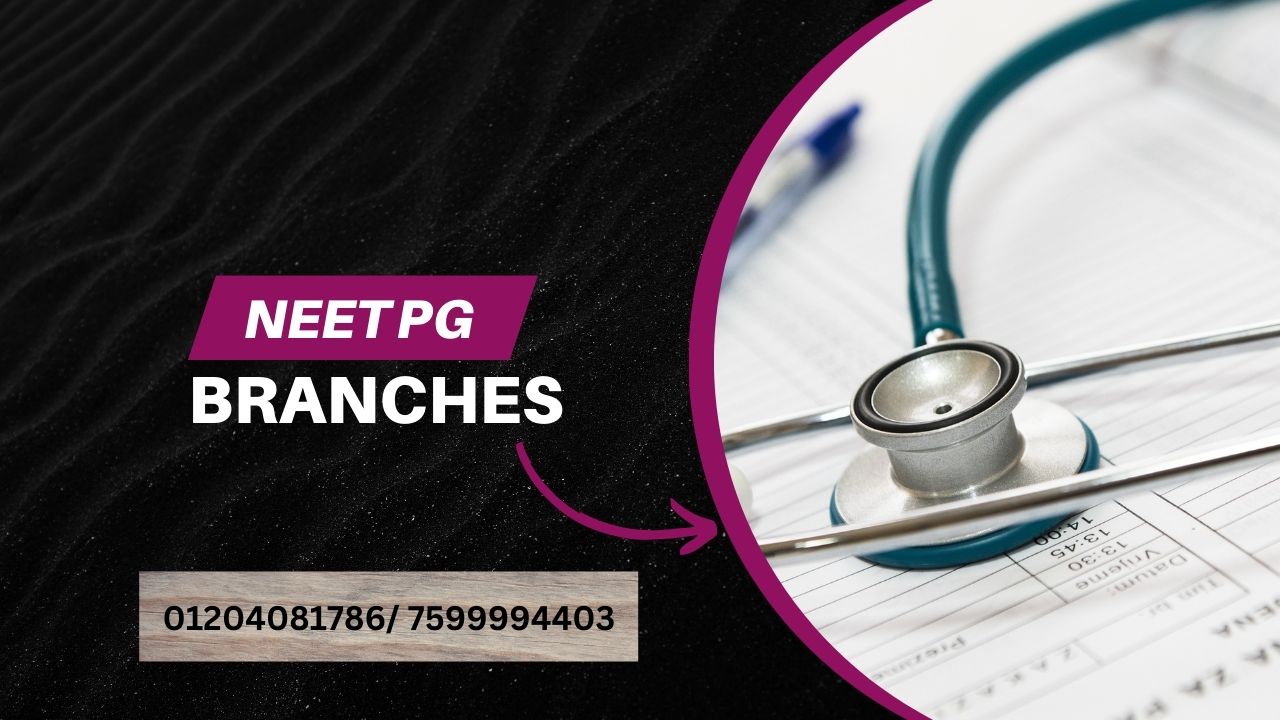Explore NEET PG subject wise weightage and also number of questions asked in exams with all relevant subject.
The NEET PG exam is mandatory for postgraduate medical admission in India. With so many subjects and amounts of study material to cover, one of the most strategic ways to get high marks in NEET PG preparation is by understanding the subject-wise weightage. Knowing how much each subject contributes to the exam can help you plan your study schedule more effectively, ensuring you spend the right amount of time on each topic and in this blog we will discuss NEET PG subject wise weightage, read this article and get full information about NEET PG exam.
MD / MS ADMISSION IN INDIA — STATE-WISE
NEET PG 2025: Overview
NEET PG 2025 is a national-level entrance exam in India for students who want to start their postgraduate medical courses like MD, MS, and PG Diploma. This exam is conducted by the National Board of Examinations (NBE), and thousands of medical graduates appear for this entrance exam every year.
The exam tests your knowledge of MBBS subjects and has an important role in getting admission to top medical colleges. Staying updated with the syllabus, exam pattern, and important dates is important for the NEET-PG exam.
NEET PG Exam Pattern 2025
The NEET PG exam pattern provides candidates with understanding of the test structure and format. It is a computer-based multiple-choice questions (MCQs) exam. The exam generally has 200 questions, and each correct answer gives 4 marks, while 1 mark is deducted for every wrong answer.
The total duration for the exam is 3.5 hours. Subjects are based on the MBBS curriculum, including pre-clinical, para-clinical, and clinical topics. Having information about the pattern can help students to plan better and feel more confident in the exam.
NEET PG 2025: Difficulty Level & Paper Pattern
NEET PG 2025 is a moderate difficulty level exam, similar to previous years. The exam will test your knowledge of medical subjects with its easy and challenging questions. It’s important to stay calm and prepare well to answer all types of questions confidently.The paper pattern generally includes 200 multiple-choice questions from subjects like Anatomy, Pharmacology, and Pathology. The exam is conducted in a single shift, and you need to complete it within three and a half hours. Having information about the pattern helps you plan your time better during the test.
Branches With Low Interest
Some school subjects have fewer students than we might expect. For example, subjects like Philosophy and Astronomy have low numbers of learners. However, branches with low representation are still important. They help students think differently and learn new skills. Encouraging more people to try these branches.
Which Subjects Were Most Difficult in NEET PG 2025?
In NEET PG 2025, many students found subjects like Medicine and Surgery the most difficult. These subjects have a wide syllabus and require deep understanding of complex concepts. The questions often tested practical knowledge, making it challenging for many aspirants.Additionally, subjects like Pharmacology and Obstetrics & Gynecology were difficult because they involved memorizing a lot of details. Time management during the exam also made it harder to answer all questions confidently. Overall, these subjects demanded focus and consistent preparation.
Understanding the NEET PG Exam Format
Before we get into the weightage breakdown, it’s essential to understand the structure of the NEET PG exam. The exam consists of 200 multiple-choice questions (MCQs), which are divided into 19 subjects. The questions are based on subjects that you have studied during your undergraduate medical education (MBBS).
NEET PG Subject Wise Weightage
| Subject | Weightage (%) |
|---|---|
| Anatomy | 15 |
| Physiology | 10 |
| Biochemistry | 10 |
| Pharmacology | 10 |
| Microbiology | 10 |
| Pathology | 12 |
| Forensic Medicine | 6 |
| Social and Preventive Medicine (SPM) | 7 |
| General Medicine | 20 |
| General Surgery | 20 |
| Obstetrics and Gynecology | 15 |
| Pediatrics | 10 |
| Orthopedics | 5 |
| Ophthalmology | 5 |
| ENT (Ear, Nose, Throat) | 5 |
| Radiology | 5 |
The exam has a total duration of 3.5 hours, and each correct answer gives you 4 marks, while incorrect answers result in a penalty of 1 mark. Given the competitive nature of the exam, scoring well is all about focusing on topics and understanding the subject-wise weightage to make your preparation more strategic.
Importance of NEET PG Subject Wise Weightage
The allocation of questions across subjects can vary each year, but by analyzing previous exams, we can evaluate how much weight each subject generally carries. This knowledge is because it helps candidates allocate their study time more effectively. High-weightage subjects need more in-depth preparation, while low-weightage subjects can be covered with less time.
NEET PG 2025 Subject-Wise Weightage of Questions
The NEET PG exam will include questions from all subjects studied during the MBBS course, but the number of questions from each subject will depend on weightage. Clinical subjects like Medicine, Surgery, and Obstetrics & Gynecology generally have higher weightage, while pre-clinical subjects like Anatomy and Physiology have few questions.
Understanding the subject-wise weightage for students to plan their preparation. Focusing more on high weightage subjects can improve your scores, but it’s important not to totally ignore the low-weightage subjects completely, as every mark matters in this entrance exam(NEET PG).
NEET PG 2025 Pre-Clinical Subjects
NEET PG exam will test students on pre-clinic knowledge on subjects like Anatomy, Physiology, and Biochemistry. These subjects provide you medical knowledge about the medical specialization and help you in understanding how the human body works. A good knowledge about these topics is important for diagnosing and treating diseases.
To score well in the NEET PG exam, students should focus on understanding concepts rather than just memorizing. Regular revision, practicing MCQs, and using standard textbooks can make your preparation easy. A good fundamental knowledge in pre-clinical subjects provides you confidence for clinical training.
Marks Distribution of NEET PG Exam 2025
The NEET PG exam follows a marks distribution pattern to test medical graduates’ knowledge. It includes 200 multiple-choice questions, with each correct answer carrying 4 marks and 1 mark deducted for each wrong answer. The total marks are 800.
The questions are divided among various subjects studied during MBBS, like Anatomy, Physiology, Pharmacology, and Medicine. Clinical subjects generally carry more weightage. Understanding the marks distribution helps students to focus better on high weightage topics during preparation.
NEET PG 2025 Strategies for Preparation
Preparing for NEET PG requires a good study plan and consistency. Start by understanding the syllabus and exam pattern first. Make a study plan that includes daily goals, revision time, and breaks between study. Use standard textbooks and trusted online resources for preparation.
Practice as many mock tests and previous year question papers as possible to improve your speed and accuracy. Focus more on high weightage topics and keep revising and practicing mock tests and previous year question papers regularly. Stay positive, avoid burnout, and believe in your efforts.
NEET PG Subjects
Here’s a categorized list of NEET PG subjects — divided into Pre-Clinical, Para-Clinical, and Clinical sections — as per the current medical curriculum and NEET PG exam syllabus (based on the latest NMC/MBBS structure):
Pre-Clinical Subjects
These subjects are taught during the 1st year of MBBS and form the foundation of medical sciences.
- Anatomy
- Physiology
- Biochemistry
Para-Clinical Subjects
These are covered during the 2nd year of MBBS and bridge the gap between basic and clinical sciences.
- Pathology
- Pharmacology
- Microbiology
- Forensic Medicine
- Community Medicine (PSM – Preventive & Social Medicine)
Clinical Subjects
Taught in the 3rd and final years of MBBS; these form the bulk of NEET PG questions.
- General Medicine
- Dermatology and Venereology
- Psychiatry
- General Surgery
- Orthopaedics
- Otorhinolaryngology (ENT)
- Ophthalmology
- Obstetrics and Gynaecology
- Paediatrics
- Anaesthesiology
- Radiodiagnosis
- Radiotherapy
Important Notes:
- The NEET PG exam typically includes questions from all 20 subjects, with emphasis on clinical application and integrated concepts.
- Each subject contributes different weightages, with clinical subjects carrying higher marks.
- The syllabus is based on the latest MBBS curriculum prescribed by the National Medical Commission (NMC).
No. of Question NEET PG Subject Wise Weightage
When preparing for NEET PG, the goal should be to balance your preparation across all subjects but to give extra attention to the topics that have a higher number of questions. You are more likely to secure a higher score, improving your chances of getting into a good medical college for your postgraduate studies.
- Anatomy
Anatomy is a fundamental subject that is the basis for understanding other medical subjects. It carries around 15-20 questions in NEET PG. The questions are often clinical in nature, testing not only theoretical knowledge but also the application of anatomical knowledge in real-life scenarios. It’s important to focus on the key systems, such as the musculoskeletal system, the nervous system, and the cardiovascular system.
- Physiology
Physiology has a similar weightage to Anatomy, contributing around 15-20 questions in the exam. Physiology is the study of the body’s functions, and understanding of how different organs and systems work. Topics like the cardiovascular system, respiratory system, and renal physiology are often asked in the exam. Focus on understanding physiological processes rather than memorizing facts, as NEET PG often tests your ability to apply concepts in clinical situations.
- Biochemistry
Biochemistry deals with the chemical processes within living organisms. This subject generally carries about 10-15 questions. The topics you need to focus on include metabolism (carbohydrates, proteins, lipids), enzyme function, and genetic material. Understanding the biochemical pathways and their regulation is key for answering clinical questions.
- Pharmacology
Pharmacology is important for understanding how drugs work and interact with the body. NEET PG usually includes about 10-15 questions from this subject. The focus is on drug mechanisms, therapeutic uses, adverse effects, and drug interactions. Given its direct clinical application, it’s important to memorize important drug classes and their side effects, as well as to understand pharmacokinetics and pharmacodynamics.
- Microbiology
Microbiology is another subject that contributes around 10-15 questions in the exam. The questions are generally focused on bacteriology, virology, parasitology, and mycology. You must also have a good understanding of immunology, as it often overlaps with other branches like Pathology and Pharmacology. Topics like bacterial infections, viral diseases, and the mechanisms of antimicrobial resistance are commonly tested.
- Pathology
Pathology is a subject that deals with the study of diseases and their effects on the body. It has one of the highest weightages, with 15-20 questions typically appearing in the NEET PG exam. Pathology questions are clinical and are often based on systemic pathology, such as cardiac, respiratory, and renal pathologies. Focus on understanding the pathophysiology of common diseases, diagnostic criteria, and laboratory findings.
- Forensic Medicine
Forensic Medicine typically contributes 5-10 questions. While it is not as weighted as other subjects, it is still important because it deals with the application of medical knowledge to legal issues, such as determining causes of death or injury. Topics like forensic toxicology, forensic pathology, and medico-legal aspects are essential areas to focus on.
- Social and Preventive Medicine (SPM)
SPM, also known as Community Medicine, is one of the more significant subjects in terms of public health. This subject carries around 10-15 questions. It involves understanding epidemiology, health statistics, vaccination schedules, environmental health, and national health programs. Given its relevance to health policies, this subject can be provided if approached strategically.
- Medicine
Medicine is one of the most important subjects in NEET PG, with a weightage of 20-25 questions. It involves a deep understanding of common medical conditions, diagnostics, and treatments across various specialties like cardiology, nephrology, endocrinology, and gastroenterology. The questions are generally clinical, focusing on patient management, disease processes and foundation in internal medicine is essential.
- Surgery
Surgery, much like Medicine, is a major subject with 20-25 questions. You should focus on general surgery, as well as key subspecialties like orthopedics, urology, and cardiothoracic surgery. NEET PG often tests clinical decision-making in surgical contexts, so practicing clinical scenarios and understanding surgical techniques is important.
- Obstetrics and Gynecology
Obstetrics and Gynecology usually carry 10-15 questions in NEET PG. Questions often revolve around pregnancy, labor, and delivery, as well as gynecological disorders such as menstrual abnormalities, tumors, and infections. Having a sound understanding of obstetric emergencies, family planning methods, and prenatal care is key for success in this subject.
- Pediatrics
Pediatrics carries around 10-15 questions in NEET PG. Key areas of focus include pediatric growth development, vaccinations, pediatric emergencies, and common diseases in children.
- Orthopedics
Orthopedics usually contributes 5-10 questions. This subject has questions around musculoskeletal injuries, fractures, dislocations, and joint diseases. NEET PG often includes questions that test both your theoretical knowledge and your ability to diagnose and treat orthopedic conditions.
- ENT (Ear, Nose, and Throat)
ENT typically carries 5-10 questions. This subject focuses on common disorders of the ear, nose, and throat, including infections, tumors, and congenital abnormalities. Understanding basic ENT procedures and treatments is essential for this subject.
- Ophthalmology
Ophthalmology, which deals with eye-related conditions, generally accounts for 5-10 questions. The focus is on common eye diseases, like cataracts, glaucoma, refractive errors, and retinal disorders. It’s important to understand both the clinical and surgical management of eye conditions.
- Dermatology
Dermatology usually has 5-10 questions. Common topics include skin infections, dermatological diseases, and conditions like psoriasis, eczema, and acne. Understanding the signs, symptoms, and treatment protocols for common dermatological conditions is critical.
Tips for Preparation Based on Weightage
When preparing for NEET PG, prioritize subjects with higher weightage, like Medicine, Surgery, Obstetrics, Gynecology, and Pathology. Allocate more time to these subjects, but don’t totally neglect low-weightage subjects completely. Ensure a balanced approach by focusing on topics within each subject.
Regularly revise, use practice tests, and take mock exams to familiarize yourself with the exam format. Time management during the exam is also essential be sure to practice answering questions within the allotted time.

FAQs:
Ans. It helps you prioritize subjects and topics that carry more marks, allowing you to allocate more time and effort to high-weightage subjects.
Ans. The subjects with the highest weightage in NEET PG are Medicine, Surgery, Obstetrics, Gynecology, and Pathology. These subjects typically contribute around 20-25 questions each. Focusing on these subjects will yield significant results.
Ans. To effectively divide your study time, allocate more time to high-weightage subjects like Medicine, Surgery, and Pathology. For subjects with lower weightage like Orthopedics or Dermatology, allocate less time, but don’t ignore them completely.
Ans. While all subjects are important, you can give relatively less time to subjects with lower weightage, such as Orthopedics, ENT, Ophthalmology, and Dermatology.
Ans. Both theory and practical questions are equally important. It’s essential to first build a strong theoretical foundation by understanding key concepts, especially in subjects like Pathology and Physiology.
Ans. Revision is crucial, especially in the last 1-2 months leading up to the exam. You should aim for at least 30-40% of your study time to be spent on revision. Focus more on high-weightage subjects during this period and make sure to revise important clinical concepts, drug classifications, and diagnostic criteria.
Ans. Regularly take mock tests and practice papers to assess your preparation. This will help you get familiar with the exam format, time management, and identify your weak areas.
Connect with Us
Start your medical educational journey with the Admission Zone! Contact us today on 9205488482/ 7599994403 or WhatsApp us to explore a world of educational possibilities in the state and secure your admission to a brighter future.
Conclusion:
Understanding the subject wise weightage for NEET PG allows you to prepare and focus on areas that will give you the maximum marks in your exam for your time and effort. While it’s essential to cover the entire syllabus, giving more attention to high-weightage subjects can significantly improve your chances of success. Remember, a well-planned and consistent study routine, combined with strategic revision, is the key to score high marks in NEET PG. With focused preparation and a clear understanding of the NEET PG subject wise weightage, you will be well on your way to securing a high rank in the exam and advancing your medical career.








